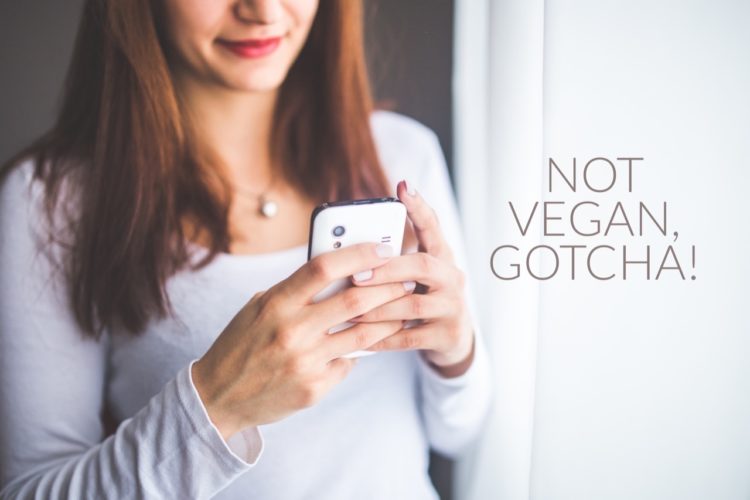The bigger my Instagram account gets, the more I get comments and DMs from people playing what I call the “vegan gotcha game”. They’re basically claiming something isn’t vegan for any number of reasons including:
- It’s not certified vegan.
- It contains a cross contamination statement due to shared equipment.
- Certain ingredients like enzymes, mono and diglycerides and others cannot be verified that they’re from plant sources.
- The sugar cannot be verified that it hasn’t gone through bone char processing.
There are many others including ethical company practices, artificial ingredients and more. The list is endless. They’re saying “gotcha! See it isn’t vegan!!!” Are these concerns valid? Let’s dive into that a bit more.
Number one. Veganism isn’t a religion. Either out of fear or a zealous attempt to stick to tenets they believe to be true about veganism, some do not tolerate any deviation like many organized religions. The difference is that you will not be excommunicated or shunned from veganism for slipping up, eating at a non-vegan restaurant or doing or eating something that you were unaware was not generally accepted as being vegan. There’s no vegan police (although some feel they have badges) coming to arrest you. To further drive home my analogy, all Christian religions have a basis in all encompassing beliefs then some sects teach and believe very different things than others. They’re all considered Christian (like vegans) yet there can be extreme differences between them. Some come to veganism for a pure love of animals and to do no harm. Some come for health reasons to help a condition or allergy they may have. There’s no one size fits all right way to start a vegan journey. No matter how we may start, let’s hope we all reach the same destination.
Another question you need to ask yourself when you have an issue and need to be vocal about it is “am I helping veganism?”. If it’s just your ego that drives your response or your need to be heard or confirmation that you’re right, you have to ask yourself if you’re truly helping the vegan cause. The answer is usually no, you’re not.
Let’s talk a bit about cross contamination as it’s the number one comment I get when I post a product that contains a statement that it “may” contain an animal product or a trace of one. Cross contamination is a modern reality due to manufacturing on shared equipment and even certified vegan products are allowed it as long as the manufacturer has taken reasonable steps to avoid it. It’s not even a legal requirement as far as I know and there’s no standard way a company must disclose this information on their packaging. Some may simply say “may contain…XYZ” and others may say “processed on equipment used to make XYZ” but it’s there to warn those with severe allergies that these allergens might be present in trace amounts and cause a reaction. It’s important to remember that “may” contain doesn’t mean “does” contain. It’s not part of the ingredients list. It’s not there to say “hey, vegans! This isn’t really vegan!” Even PETA agrees this type of reasoning takes it too far. According to their website this is what they have to say on the subject:
“Some packaged foods have a long list of ingredients. The farther an ingredient is down the list, the less of that ingredient is in the food. People who have made the compassionate decision to stop eating animal flesh, eggs, and dairy products may wonder if they need to read every ingredient to check for tiny amounts of obscure animal products. Our general advice is not to worry too much about doing this. The goal of being vegan is to help animals and reduce suffering; this is done by choosing a bean burrito or a veggie burger over chicken flesh, or choosing tofu scramble over eggs, not by refusing to eat an otherwise vegan food because it has 0.001 grams of monoglycerides that may possibly be animal-derived.
We discourage vegans from grilling waiters at restaurants about micro-ingredients in vegetarian foods (e.g., a tiny bit of a dairy product in the bun of a veggie burger). Doing so makes being vegan seem difficult and dogmatic to your friends and to restaurant staff, thus discouraging them from going vegan themselves (which really hurts animals). And we urge vegans not to insist that their food be cooked on equipment separate from that used to cook meat; doing so doesn’t help any additional animals, and it only makes restaurants less inclined to offer vegan choices (which, again, hurts animals).
Remember that every vegan saves nearly 200 animals a year from horrific cruelty—and by encouraging people around you to follow your lead, you can save many more.” — PETA
Hopefully, everyone is trying their best with good intentions and my personal goal is to get more people to eat vegan (or plant-based) which will help animals in the long run. No one gets to decide how vegan someone is and if they can call themselves vegan. We can worry about ourselves, but being a gatekeeper helps no one including the animals they purport to love. Let’s not be distracted by in-fighting and playing the gotcha game. Got it?





















































Thank you for this article, you hit the nail right on the head! I am an ingredient reader like most vegans and if a product says “may contain” I still purchase.
You’re welcome! It’s about progress not perfection and about making veganism accessible for everyone. 🧡
I agree with you, wholeheartedly! All vegans, part-time vegans and every other category of vegan/plant based eater are on their own journey. I would want to keep communication open so, if the situation presents itself, I can have a discussion why I chose to eat the way I do.
Of course! Thank you for your insight. We need to be inclusive and remember the big picture. 💯